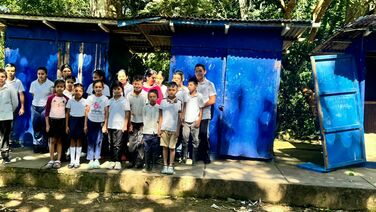
Lunyelelia Primary School
Lunyelelia Primary School was established in 2021. Prior to this school's establishment, families were sending their children to schools 1.5+ kilometers away, which put a strain on parents as they would escort their children to school, delaying their daily work. Today, the school has 135 students nad 6 staff/teachers.

Namatapa Primary School
Namatapa Primary School, located in Kaselema Village, Zomba District, serves 1,312 students (670 girls, 642 boys) with 27 teachers and a catchment population of approximately 19,000 people from 27 villages. The school relies on a functional borehole with an Afridev hand pump for water supply but with a toilet-to-student ratio of 262:1—well above the recommended 50:1 standard—the sanitation situation is critical.

Nazigo Demonstration School
Nazigo Demonstration School hosts 570 primary and nursery school students, both day and boarding, taught by 22 teachers throughout 13 classrooms.

Prathmik Balika Vidhyalaya Jelu
The proposed project will be an integrated effort to improve health and nutrition awareness among children. Availability of safe drinking water, Bio sand filters and regular check-ups to monitor the health of the students. This school has already received water and sanitation facilities.

Saviefe Deme Community School
Saviefe Deme is a rural community located in the Volta region of Ghana and has a population of approximately 3,100 people. The major economic activity in the community is subsistent farming, trading, and hunting. The people are very friendly and accommodating. Saviefe Deme Community School was established in 1964 by the Government of Ghana in partnership with the community. The school has not received any major development from the government since its establishment, so the community members always come together to support the school through communal labor with the support of other organizations. Being the only school in the area, the school currently has 150 students ranging from kindergarten to grade 9.

South Sudan School 5 (2025)
Our implementing partner, Water for South Sudan's, operations teams are based in Wau and work in remote villages in the Bahr el Ghazal region of South Sudan. These isolated villages have extremely limited access to clean water, and often can only access contaminated water that will lead to sickness or even death. WFSS works with local governments and community leaders to determine the placement of wells. The goal is to create sustainable systems, incorporating well maintenance and training as part of the installation of a well.

Apex Nursery and Primary School
Serving 373 students in Uganda’s Tula community as a private boarding and day primary and nursery school, Apex Nursery and Primary School currently relies on a metallic rainwater collection tank that has a low storage capacity and is breaking down - so much so that the Ugandan Water Project (UWP) team, our implementing partner, on the ground cited it as “beyond repairing.” The school must also bring water in from a tanker truck, meaning they pay roughly 500,000 Ush ($135 USD) monthly on water expenses alone. Apex Nursery and Primary School does use chlorine tablets to clean their water, but those are extra money and are difficult to dose. The UWP filter systems will eliminate that cost, and the water will be much safer. Overall, Apex Nursery and Primary School needs a rainwater collection system to provide safe drinking water, handwashing, and more.

Buliganwa Primary School
Buliganwa Primary School, located in the Nabitende sub-county of Iganga district in Uganda, has a total enrollment of 447 students, comprising 210 boys and 237 girls.
